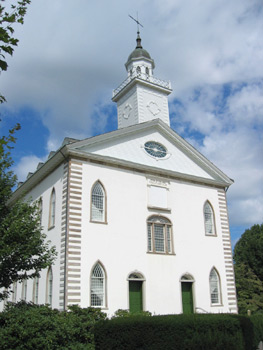Joseph Smith
Joseph Smith (December 23, 1805 – June 27, 1844) was an American religious leader and founder of Mormonism and the Latter Day Saint movement. He is best known for translating the Book of Mormon, which he claimed to have done with the guidance of divine instruments provided by an angel named Moroni. Smith's teachings and publications form the foundation of the Latter Day Saint movement's theology and practices.
Early Life[edit | edit source]
Joseph Smith was born in Sharon, Vermont, to Lucy Mack Smith and Joseph Smith Sr. His family faced significant financial difficulties and moved several times, eventually settling in western New York, a region that was experiencing a great deal of religious revivalism known as the Second Great Awakening. Smith's early encounters with religion were marked by confusion and a desire for spiritual clarity.
First Vision[edit | edit source]
At the age of fourteen, Smith claimed to have experienced a profound vision in which God the Father and Jesus Christ appeared to him in a grove of trees near his home. This event, known as the First Vision, is considered the foundational event of the Latter Day Saint movement. Smith stated that he was told to join none of the existing churches because they were all incorrect.
Translation of the Book of Mormon[edit | edit source]
In 1827, Smith reported that an angel named Moroni appeared to him and revealed the location of a buried book written on golden plates containing the religious history of an ancient American civilization. Smith claimed to have translated this book into English with the help of divine instruments, publishing it in 1830 as the Book of Mormon. The publication of the Book of Mormon marks the formal beginning of the Church of Jesus Christ of Latter-day Saints, commonly known as the Mormon Church.
Establishment of the Church[edit | edit source]
Following the publication of the Book of Mormon, Smith founded the Church of Christ in 1830 in Fayette, New York. The early church grew rapidly, and Smith received revelations directing him and his followers to move westward, eventually settling in Kirtland, Ohio; Jackson County, Missouri; and Nauvoo, Illinois. In these locations, Smith continued to develop the theology and organizational structure of the church, including the introduction of practices such as baptism for the dead and plural marriage.
Controversies and Death[edit | edit source]
Smith's teachings and practices, especially plural marriage, led to significant controversy and conflict with non-Mormon neighbors. In Missouri, tensions escalated into violent conflicts, resulting in the expulsion of the Mormons from the state. In Illinois, Smith was arrested on charges of inciting a riot after ordering the destruction of a newspaper that had criticized him and his practices. While awaiting trial in Carthage Jail, Smith and his brother Hyrum were killed by an armed mob on June 27, 1844.
Legacy[edit | edit source]
Joseph Smith's legacy is complex and multifaceted. To his followers, he is a prophet who restored the true church of Jesus Christ on earth. To others, he is a controversial figure whose teachings and practices have been the subject of criticism and debate. Despite the controversies, the religious movement he founded has grown into a global faith, with millions of adherents.
See Also[edit | edit source]
Search WikiMD
Ad.Tired of being Overweight? Try W8MD's NYC physician weight loss.
Semaglutide (Ozempic / Wegovy and Tirzepatide (Mounjaro / Zepbound) available. Call 718 946 5500.
Advertise on WikiMD
|
WikiMD's Wellness Encyclopedia |
| Let Food Be Thy Medicine Medicine Thy Food - Hippocrates |
Translate this page: - East Asian
中文,
日本,
한국어,
South Asian
हिन्दी,
தமிழ்,
తెలుగు,
Urdu,
ಕನ್ನಡ,
Southeast Asian
Indonesian,
Vietnamese,
Thai,
မြန်မာဘာသာ,
বাংলা
European
español,
Deutsch,
français,
Greek,
português do Brasil,
polski,
română,
русский,
Nederlands,
norsk,
svenska,
suomi,
Italian
Middle Eastern & African
عربى,
Turkish,
Persian,
Hebrew,
Afrikaans,
isiZulu,
Kiswahili,
Other
Bulgarian,
Hungarian,
Czech,
Swedish,
മലയാളം,
मराठी,
ਪੰਜਾਬੀ,
ગુજરાતી,
Portuguese,
Ukrainian
Medical Disclaimer: WikiMD is not a substitute for professional medical advice. The information on WikiMD is provided as an information resource only, may be incorrect, outdated or misleading, and is not to be used or relied on for any diagnostic or treatment purposes. Please consult your health care provider before making any healthcare decisions or for guidance about a specific medical condition. WikiMD expressly disclaims responsibility, and shall have no liability, for any damages, loss, injury, or liability whatsoever suffered as a result of your reliance on the information contained in this site. By visiting this site you agree to the foregoing terms and conditions, which may from time to time be changed or supplemented by WikiMD. If you do not agree to the foregoing terms and conditions, you should not enter or use this site. See full disclaimer.
Credits:Most images are courtesy of Wikimedia commons, and templates, categories Wikipedia, licensed under CC BY SA or similar.
Contributors: Prab R. Tumpati, MD






